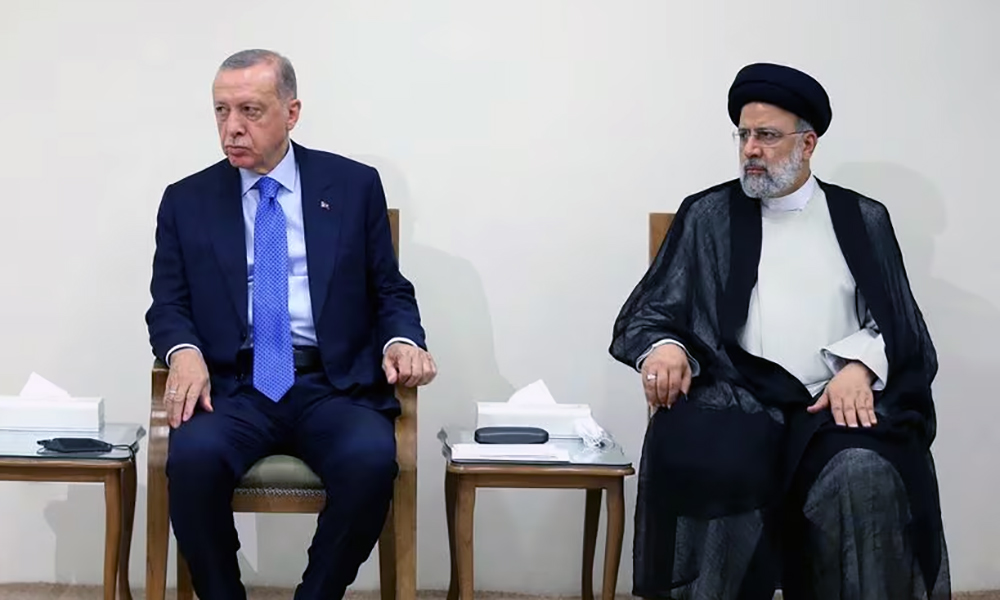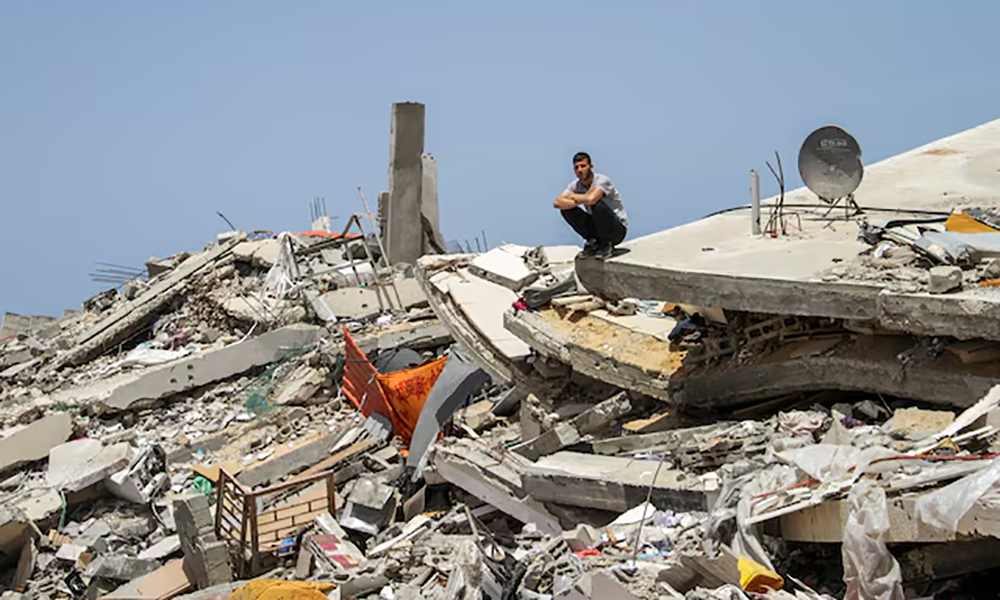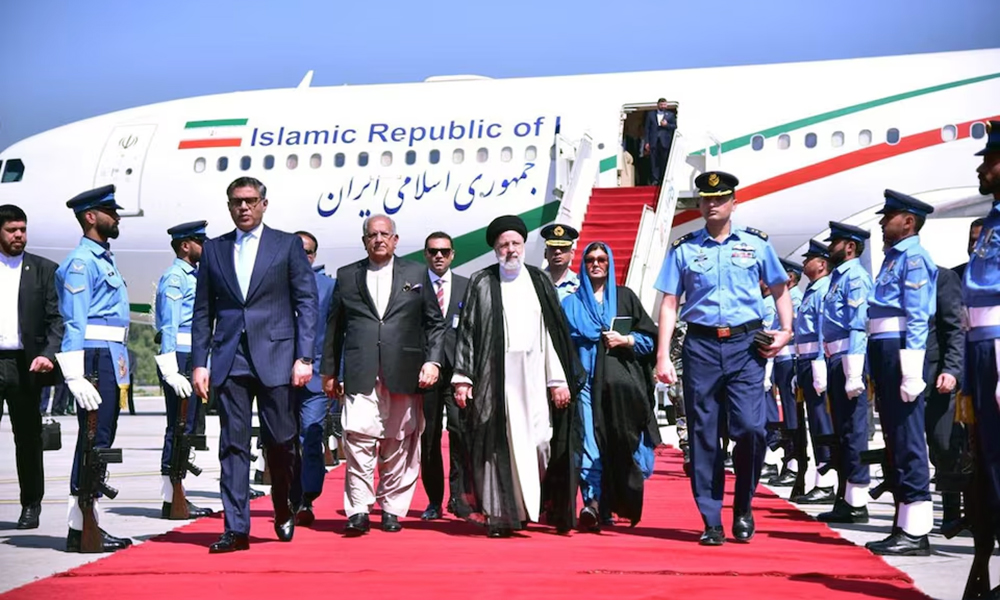Regional
Turkey, Iran agree on need to avoid escalating Mideast tensions -Erdogan

Turkish President Tayyip Erdogan said he and Iranian counterpart Ebrahim Raisi agreed at a meeting on Wednesday on the need to avoid steps that could further threaten Middle East stability three months into the Gaza war.
Turkey, which supports a two-state solution to the decades-old Israeli-Palestinian conflict, has harshly criticised Israel for its attacks on Gaza, called for an immediate ceasefire, and backed legal steps for Israel to be tried for genocide, Reuters reported.
Unlike its Western allies and some Arab nations, NATO member Turkey does not consider Palestinian militant group Hamas, whose Oct. 7 attack on Israel led to the retaliatory Israeli military campaign on Gaza, a terrorist group.
Iran leads what it calls the Axis of Resistance, a loose coalition that includes Hamas and armed Shi’ite Muslim groups around the region that have militarily confronted Israel and its Western allies. It has voiced support for Hamas.
Speaking at a news conference after meeting Raisi in Ankara, Erdogan said the two leaders had discussed ending Israel’s “inhumane” attacks on Gaza and the need to take steps for a fair and lasting peace in the region.
“We agreed on the importance of refraining from steps that will further threaten the security and stability of our region,” he said, adding the two neighbours had also agreed to continue cooperation against cross-border militant threats.
In a sign of the conflict widening, U.S. and British strikes hit Iran-backed Houthi targets in Yemen this month, in response for attacks on Red Sea shipping. Erdogan slammed the strikes as a disproportionate use of force.
Turkish Foreign Minister Hakan Fidan also said last week he had spoken to his Iranian and Pakistani counterparts after the neighbours traded cross-border fire, and called for calm.
Despite its harsh rhetoric, Ankara has maintained commercial ties with Israel, prompting criticism at home and in Iran.
Raisi accused the United States of supporting what he called Israel’s crimes against Palestinians in Gaza and repeated Tehran’s appeal for Muslim countries to cut their economic and political relations with the “Zionist regime”.
“What is happening in Palestine and Gaza is a crime against humanity … and the United States and the West are supporting these crimes,” he said.
“Cutting economic and political ties with this regime can certainly have an impact on the Zionist regime to end its crimes.”
Turkey and Iran have usually had complicated ties, standing at odds over a host of issues, primarily the Syrian civil war.
Ankara has backed rebels looking to oust President Bashar al-Assad and mounted several incursions into northern Syria against militants, while Tehran supports his government, Reuters reported.
Turkey has recently taken steps to improve ties with Damascus.
Raisi had twice postponed his visit, initially planned for November, over scheduling issues and attacks in the southeastern Iranian city of Kerman.
On Wednesday, the two leaders chaired a meeting of a Turkish-Iranian business council and signed various agreements.
Regional
New UK sanctions target Iranian drone industry

Britain on Thursday announced new sanctions targeting Iran’s military drone industry, in response to Iran’s drone and missile attack on Israel earlier this month.
The measures, taken in co-ordination with the U.S. and Canada, target four businesses and two directors at a network of drone companies with the aim of limiting Iran’s ability to launch drones.
“The Iranian regime’s dangerous attack on Israel risked thousands of civilian casualties and wider escalation in the region,” British Foreign Secretary David Cameron said in a statement.
“Today the UK and our partners have sent a clear message – we will hold those responsible for Iran’s destabilising behaviour to account.”
Britain also said it would introduce new bans on the export of drone and missile components to Iran, seeking to limit its military capabilities.
Last week, Britain imposed sanctions on Iranian military figures and organisations, in another coordinated move with the United States, following Iran’s action against Israel.
Iran launched drones and fired missiles at Israel on April 13 as a retaliatory strike for the attack on its embassy compound in Damascus two weeks prior, raising the risk of further escalation in conflict in the Middle East.
(Reuters)
Regional
Turkey accuses U.S. of double standards over Gaza in rights report

Turkey on Wednesday accused the United States of having a policy of double standards on human rights, saying Washington’s annual rights report failed to reflect Israel’s assaults in Gaza, Reuters reported.
Turkey’s foreign ministry said in a statement it was deeply concerned that the U.S. report did not “duly reflect the ongoing inhumane attacks in Gaza”.
The report was prepared with “political motives, far from impartiality and objectivity”, it said, calling on Washington to cease its “double-standard policy on human rights”.
It also cited U.S. ties with the Syrian Kurdish YPG militia which Ankara deems a terrorist organisation.
Israeli forces have killed more than 34,000 Palestinians in Gaza, according to health authorities there, many of them civilians and children. The enclave has been reduced to a wasteland and extreme food shortages have prompted fears of famine.
Israel launched its assault in response to an attack by the Hamas militant group on Oct. 7 in which Israel says 1,200 people were killed. It denies allegations of deliberately causing humanitarian suffering and targeting civilians.
Turkey has denounced Israel for its campaign in Gaza and called for a ceasefire. It has also criticised Western countries for what it calls their unconditional support of Israel, read the report.
In its report, the U.S. State Department said Israel’s war against Hamas had a “significant negative impact” on the human rights situation in Israel.
On Monday, U.S. Secretary of State AntZony Blinken rejected suggestions that Washington might have double standards over Israel’s record.
Regional
Iranian president lands in Pakistan for three-day visit to mend ties

Iranian President Ebrahim Raisi arrived in Islamabad on Monday on a three-day official visit, the foreign office said, amid tight security in the Pakistani capital, Reuters reported.
The visit, which Pakistan’s foreign office said would run until Wednesday, comes as the two Muslim neighbours seek to mend ties after unprecedented tit-for-tat military strikes this year.
“The Iranian president is accompanied by his spouse and a high-level delegation,” Pakistan’s foreign ministry said in a statement, adding that the group also included the foreign minister, other cabinet members and senior officials.
Raisi will meet Prime Minister Shehbaz Sharif and other officials, besides visiting the eastern city of Lahore and southern port city of Karachi, it added.
Major highways in Islamabad were blocked as part of the security measures for Raisi’s arrival, while the government declared a public holiday in Karachi, read the report.
Raisi’s visit is a key step towards normalising ties with Islamabad, but Iran’s supreme Leader Ayatollah Ali Khameni, not the president, has the last say on state matters, such as nuclear policy.
Tension is also high in the Middle East after Iran launched an unprecedented attack on Israel a week ago and central Iran in turn suffered what sources said was an Israeli attack on Friday.
Pakistan and Iran have had a history of rocky relations despite a number of commercial pacts, with Islamabad being historically closer to Saudi Arabia and the United States.
Their highest profile agreement is a stalled gas supply deal signed in 2010 to build a pipeline from Iran’s South Fars gas field to Pakistan’s southern provinces of Balochistan and Sindh, Reuters reported.
Despite Pakistan’s dire need of gas, Islamabad has yet to begin construction of its part of the pipeline, citing fears over U.S. sanctions – a concern Tehran has rejected.
Pakistan said it would seek waivers from the U.S., but Washington has said it does not support the project and warned of the risk of sanctions in doing business with Tehran.
Faced with the possibility of contract breach penalties running into the billions of dollars, Islamabad recently gave the go-ahead for construction of an 80-km (50-mile) stretch of the pipeline.
-

 Latest News3 days ago
Latest News3 days agoRashid Khan named AWCC’s brand ambassador
-

 Regional4 days ago
Regional4 days agoIranian president lands in Pakistan for three-day visit to mend ties
-

 Sport4 days ago
Sport4 days agoKolkata beat Bengaluru by one run in IPL as Kohli fumes at dismissal
-

 Sport4 days ago
Sport4 days agoACL: Aino Mina 3-0 Istiqlal Kabul; Attack Energy 3-0 Khadim
-

 Climate Change4 days ago
Climate Change4 days agoRescuers race to reach those trapped by floods in China’s Guangdong
-

 Business5 days ago
Business5 days agoAfghanistan, Kazakhstan to hold joint expo in Kabul
-

 World3 days ago
World3 days agoMalaysian navy helicopters collide in mid-air, 10 killed
-

 Sport3 days ago
Sport3 days agoJaiswal ton powers Rajasthan to big IPL win
























